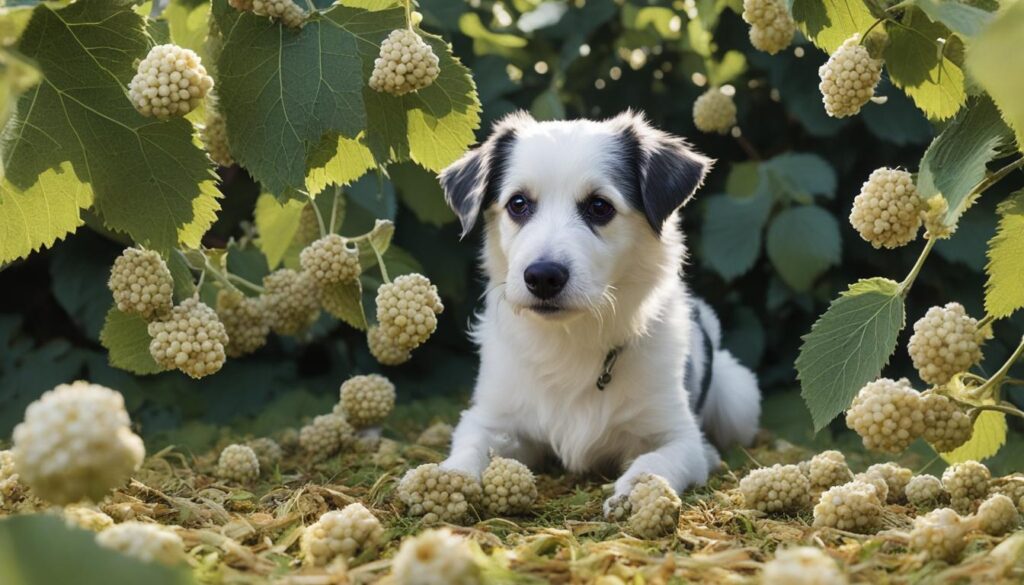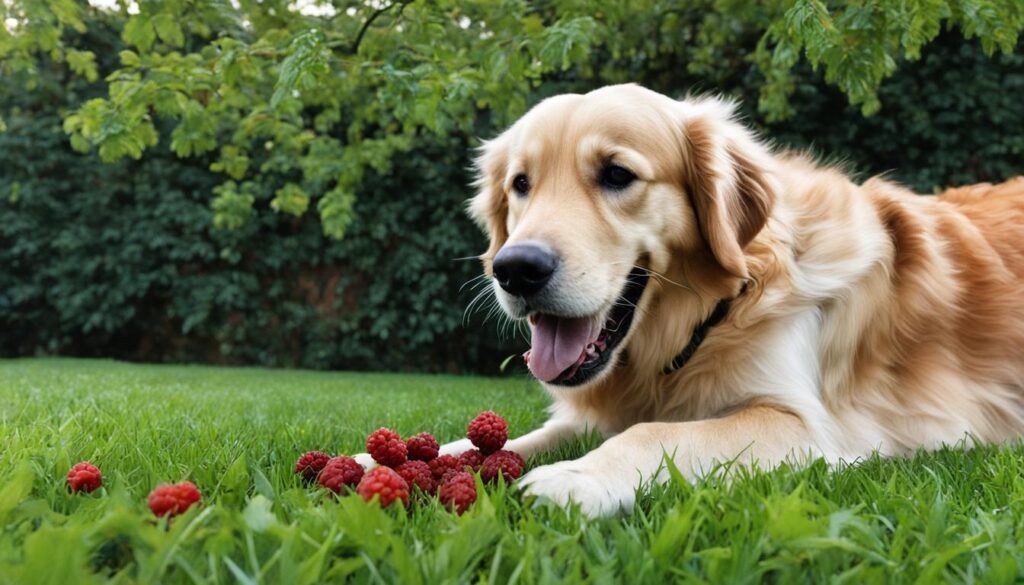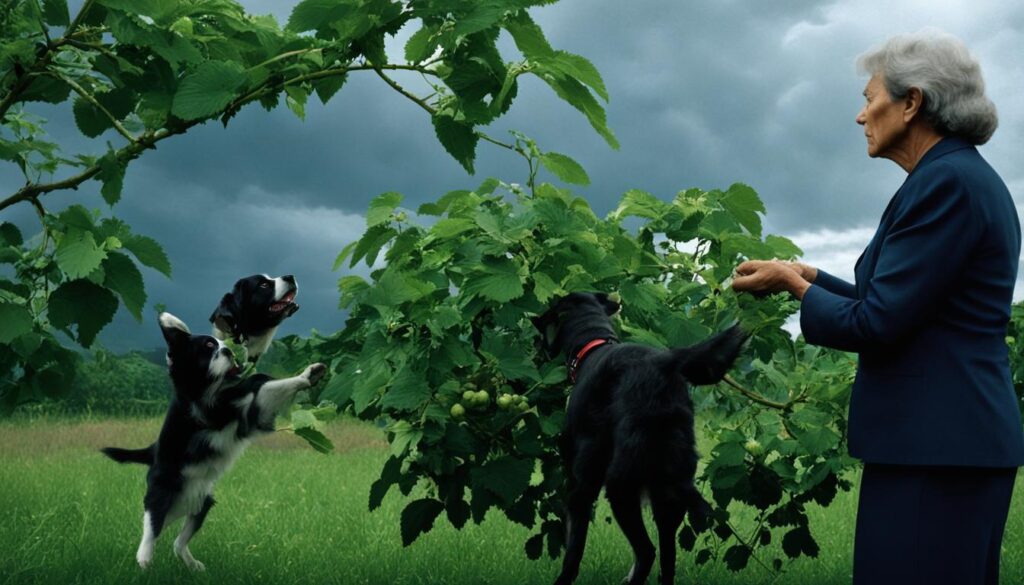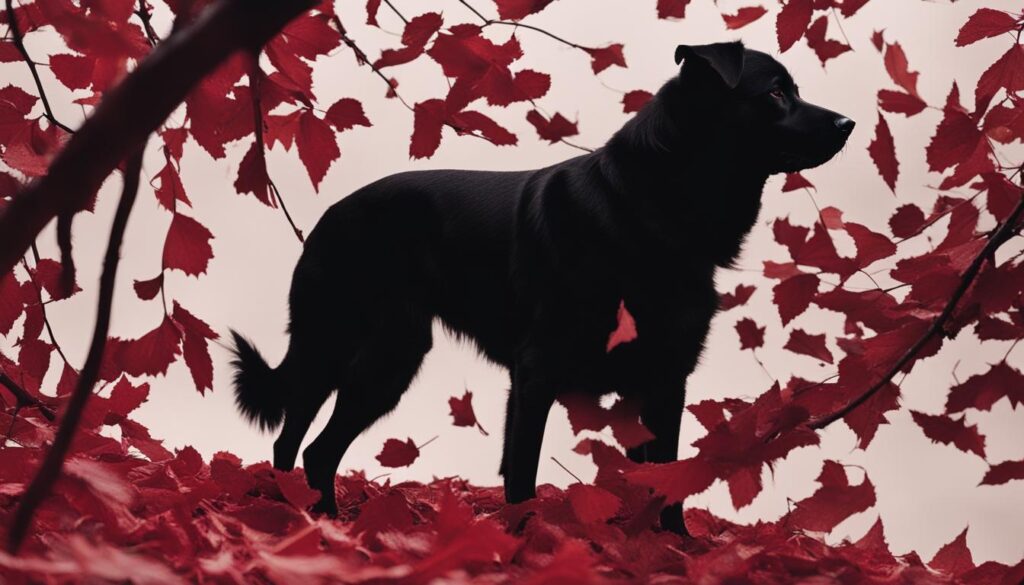Mulberries are a delicious and nutritious fruit that many people enjoy. But what about our furry friends? Can dogs eat mulberries? Let’s explore whether mulberries are safe for dogs to eat and how to incorporate them into their diet.
Are mulberries safe for dogs to eat? The answer is yes, but in moderation. Mulberries are a healthy treat for dogs as they contain beneficial nutrients such as iron and vitamin C. These nutrients can support your dog’s overall health and well-being.
However, it’s important to remember that dogs have sensitive digestive systems, and feeding them too many mulberries can lead to digestive upset. Therefore, it’s recommended to introduce mulberries gradually into your dog’s diet and observe their reaction.
If you notice any signs of digestive discomfort, such as diarrhea or upset stomach, it’s best to limit or stop feeding mulberries to your dog. Every dog is unique, and some may have sensitivities or allergies to certain foods, including mulberries.
Key Takeaways:
- Mulberries can be a safe and healthy treat for dogs when fed in moderation.
- They contain beneficial nutrients like iron and vitamin C.
- Monitor your dog’s reaction to mulberries and avoid feeding them too many.
- Stop feeding mulberries if your dog shows signs of digestive upset.
- Consult with your veterinarian before introducing mulberries into your dog’s diet.
Can Dogs Eat White Mulberries?

White mulberries are a safe and nutritious option for dogs. Just like other types of mulberries, white mulberries offer a variety of health benefits for our furry friends. They are rich in antioxidants, vitamins, and fiber, which can support your dog’s overall well-being.
Feeding white mulberries to dogs can provide them with essential nutrients that promote a healthy immune system, improve digestion, and contribute to their skin and coat health. The antioxidants found in white mulberries can help protect against cellular damage caused by harmful free radicals. Additionally, the high fiber content can aid in digestion and regulate bowel movements.
When introducing white mulberries into your dog’s diet, it is important to do so in moderation. While they are generally safe for dogs, excessive consumption can lead to digestive upset. Start by offering a small amount and closely observe how your dog reacts. If they tolerate the mulberries well, you can gradually increase the serving size.
Health Benefits of White Mulberries for Dogs:
- Rich in antioxidants that help protect against cellular damage
- Contain vitamins that support a healthy immune system
- High fiber content aids in digestion and regulates bowel movements
- Promote skin and coat health
“White mulberries offer similar health benefits to other types of mulberries, including antioxidants and vitamins.”
Remember to always wash white mulberries thoroughly before feeding them to your dog to remove any dirt or potential pesticides. It’s also important to note that while white mulberries are safe for dogs, other parts of the mulberry tree, such as the leaves and branches, may not be suitable for consumption and should be avoided.
To give you a better idea of the nutritional value of white mulberries, here’s a comparison of their nutrient content per 100 grams:
| Nutrient | Amount |
|---|---|
| Calories | 43 kcal |
| Protein | 1.4 g |
| Fat | 0.4 g |
| Carbohydrates | 9.8 g |
| Fiber | 1.7 g |
| Vitamin C | 36.4 mg |
| Vitamin E | 1.8 mg |
| Potassium | 197 mg |
| Calcium | 39 mg |
| Iron | 1.9 mg |
As with any new food, it’s always a good idea to consult with your veterinarian before incorporating white mulberries into your dog’s diet. They can provide personalized advice based on your dog’s specific needs and health conditions.
Can Dogs Eat Red Mulberries?

Red mulberries are safe for dogs to eat, but it is important to feed them in moderation. These berries offer antioxidants and other nutrients that can benefit a dog’s health. However, excessive consumption of red mulberries can lead to digestive issues, so it is essential to monitor your dog’s intake.
Health Benefits of Red Mulberries for Dogs
Red mulberries provide several health benefits for dogs:
- Antioxidants: Red mulberries are rich in antioxidants, which help protect cells from damage caused by harmful free radicals.
- Nutritional Value: These berries contain essential nutrients such as vitamins A, C, and E, as well as fiber and potassium.
- Immune Support: The antioxidants in red mulberries can support a healthy immune system in dogs.
Feeding Red Mulberries to Dogs
When feeding red mulberries to dogs, it is important to:
- Offer in moderation: While red mulberries are safe for dogs, excessive consumption can lead to digestive issues. Limit the amount of red mulberries given to your dog.
- Monitor for adverse reactions: Every dog is unique, so it’s important to monitor your dog for any allergic reactions or digestive upset after consuming red mulberries. If any adverse reactions occur, discontinue feeding them.
Red Mulberries Toxic to Dogs
Red mulberries are not considered toxic to dogs when consumed in moderation. However, if a dog ingests a large amount of red mulberries, it may result in digestive issues such as diarrhea or an upset stomach. If you suspect your dog has eaten too many red mulberries and is experiencing severe symptoms, consult your veterinarian.
Are Mulberries Bad For Dogs?

Mulberries are generally not bad for dogs and can even provide some health benefits. These small, sweet berries are packed with nutrients like vitamins, minerals, and antioxidants that can support your dog’s overall well-being. However, it’s important to remember that moderation is key when feeding mulberries to your furry friend.
While mulberries offer nutritional value, excessive consumption can lead to digestive upset in dogs. One of the main reasons is their high fiber content. Fiber is essential for a dog’s digestive health, but too much of it can cause loose stools and gastrointestinal discomfort. Therefore, it’s crucial to offer mulberries as a treat in appropriate portions.
A suitable serving size of mulberries for dogs varies depending on factors such as their size, weight, and overall health. Generally, it’s best to start with small amounts and observe how your dog reacts. If they tolerate mulberries well without any negative effects, you can continue offering them occasionally as a treat.
To give you an idea of the nutritional composition of mulberries, here’s a breakdown per 100 grams:
| Nutrient | Amount |
|---|---|
| Calories | 43 kcal |
| Carbohydrates | 9.8 grams |
| Fiber | 1.7 grams |
| Fat | 0.4 grams |
| Protein | 1.4 grams |
| Vitamin C | 36 milligrams |
| Vitamin K | 7.8 micrograms |
| Potassium | 194 milligrams |
| Iron | 1.85 milligrams |
Note: These nutritional values may vary slightly depending on the specific variety of mulberries.
In addition to their nutritional content, mulberries contain antioxidants that can help protect your dog’s cells from damage caused by harmful free radicals. These antioxidants may contribute to overall health and potentially support the immune system.
However, it’s crucial to remember that every dog is different, and some individuals may have sensitivities or allergies to certain foods, including mulberries. If you notice any adverse reactions, such as vomiting, diarrhea, or other signs of discomfort after feeding mulberries, it’s best to discontinue their intake and consult with a veterinarian.
Overall, while mulberries are generally safe for dogs, it’s important to offer them in moderation and observe your pet’s response. By doing so, you can provide a tasty and nutritious treat while ensuring your dog’s well-being.
Are Mulberries Safe For Dogs?

Mulberries are widely enjoyed by humans for their sweet taste and numerous health benefits. But what about our furry friends? Can dogs safely eat mulberries? Let’s explore the safety of mulberries for dogs and their impact on dog health.
Mulberries are indeed safe for dogs to eat, but as with any new food, moderation is key. These juicy berries offer various health benefits to our canine companions. They are packed with antioxidants, which help fight against harmful free radicals and promote overall wellbeing. Additionally, mulberries are a good source of vitamins, such as vitamin C, which supports immune function.
However, it’s important to exercise caution when introducing mulberries to your dog’s diet. Too many mulberries can lead to digestive issues such as upset stomach, diarrhea, or even pancreatitis. Therefore, it’s crucial to monitor your dog’s intake and offer mulberries as an occasional treat rather than a regular part of their diet.
To avoid any mishaps, start by feeding your dog a small amount of mulberries and observe their reaction. If your dog tolerates them well and shows no signs of gastrointestinal upset, you can gradually increase the portion size. Remember, every dog is unique, and what works for one may not work for another.
If you’re considering incorporating mulberries into your dog’s diet, consult with your veterinarian beforehand. They can provide personalized advice based on your dog’s specific needs and health conditions.
The Nutritional Benefits of Mulberries for Dogs
Mulberries offer several nutritional benefits that can positively impact your dog’s health. Here are some key nutrients found in mulberries:
- Antioxidants: Mulberries are rich in antioxidants, which help protect cells from damage caused by oxidative stress.
- Vitamin C: This essential vitamin supports immune function and aids in collagen production.
- Dietary Fiber: Mulberries contain fiber, which can aid in digestion and promote bowel regularity.
- Vitamin K: Mulberries are a good source of vitamin K, which plays a role in blood clotting and bone health.
However, it’s important to note that while mulberries offer nutritional benefits, they should not replace a balanced and complete dog food diet. Mulberries should only be given as an occasional snack or treat.
In conclusion, mulberries can be a safe and enjoyable addition to your dog’s diet when fed in moderation. They offer health benefits such as antioxidants and vitamins. However, be mindful of your dog’s individual tolerance and avoid overfeeding to prevent any potential digestive issues. As always, consult with your veterinarian before introducing any new foods to your dog.
Can Dogs Eat Dried Mulberries?

While it is safe for dogs to eat dried mulberries, it is important to consider their nutritional value. Dried mulberries are higher in calories and sugar compared to fresh mulberries, which can contribute to weight gain and other health issues in dogs. It is best to offer fresh mulberries as a treat instead.
Dogs love the taste of dried mulberries, but it’s essential to remember that moderation is key. These dried fruits are a concentrated source of calories and natural sugars, which may not be ideal for dogs, especially those with weight management concerns or diabetes. Feeding dried mulberries to dogs should be done sparingly, considering their high caloric content.
However, if you choose to offer dried mulberries to your furry friend, it’s crucial to ensure they are free from any sweeteners, additives, or preservatives. Always read the ingredient list and avoid any dried mulberries that have added sugars or artificial flavors, as these can be harmful to dogs.
If your dog has any pre-existing health conditions or dietary restrictions, it is recommended to consult with your veterinarian before introducing dried mulberries into their diet. Your vet can provide personalized advice based on your dog’s specific needs.
Can Dogs Eat Mulberry Leaves?
Mulberry leaves are safe for dogs to eat, but it is important to limit their consumption. While these leaves are not toxic to dogs, excessive amounts can lead to digestive issues. It is best to offer mulberry leaves as an occasional snack rather than a regular part of a dog’s diet.
Feeding mulberry leaves to dogs can provide some health benefits, as they contain various vitamins and minerals. However, it is crucial to monitor your dog’s intake and observe any adverse reactions.
“While mulberry leaves are safe for dogs, moderation is key to prevent digestive upset.”
When giving your dog mulberry leaves, ensure they are clean and free from any pesticides or chemicals. It’s recommended to use leaves from fresh and organic sources.
Remember that each dog is unique, and their tolerance to certain foods may vary. If you’re uncertain about feeding mulberry leaves to your dog or if they have any underlying health conditions, consult with a veterinarian for guidance.
| Benefits of Mulberry Leaves for Dogs | Precautions for Feeding Mulberry Leaves to Dogs |
|---|---|
|
|
Are Mulberry Leaves Toxic To Dogs?

Mulberry leaves are a commonly encountered plant material in many parts of the world, and it’s natural for dog owners to wonder whether they are safe for their pets to consume. While mulberry leaves are not considered toxic to dogs, it is important to exercise caution and offer them in moderation.
Eating too many mulberry leaves can cause digestive upset in dogs, including symptoms such as diarrhea. Therefore, it is crucial to monitor your dog’s intake and avoid overfeeding them with these leaves. Mulberry leaves can be given as an occasional snack, but they should not be a regular part of their diet.
To ensure the well-being of your dog, it is always a good idea to consult with your veterinarian before introducing any new type of food into their diet, including plant materials like mulberry leaves. Your vet can provide personalized advice and recommendations based on your dog’s specific needs and health conditions.
While mulberry leaves are generally safe for dogs, it’s essential to be mindful of their potential effects on your pet’s digestive system. By offering mulberry leaves in moderation and keeping a close eye on your dog’s well-being, you can ensure their continued good health and safety.
Are Mulberries The Same As Juniper Berries?
Mulberries and juniper berries are not the same. While both are types of berries, there are significant differences between them, especially when it comes to their effects on dogs.
Differences Between Mulberries and Juniper Berries
1. Safety for Dogs:
Mulberries are safe for dogs to eat and can be included in their diet as a healthy treat. On the other hand, juniper berries are toxic to dogs and should be avoided completely.
2. Nutritional Value:
| Mulberries | Juniper Berries |
|---|---|
| Contain vitamins, minerals, and antioxidants | Contain essential oils and compounds toxic to dogs |
| Provide dietary fiber and beneficial nutrients | Can cause gastrointestinal upset and other health issues in dogs |
3. Taste and Appearance:
Mulberries have a sweet taste and are available in different colors, including red, black, and white. Juniper berries have a tart and bitter flavor and are typically small and dark blue in color.
4. Culinary Uses:
Mulberries are often enjoyed fresh, used in various recipes, or dried for long-term storage. Juniper berries are commonly used as a flavoring in certain cuisines, such as gin production.
In conclusion, mulberries and juniper berries are distinct in terms of their safety for dogs, nutritional content, taste, and culinary applications. While mulberries can be a safe and nutritious addition to a dog’s diet, juniper berries are toxic and should never be fed to dogs.
It is essential for dog owners to be aware of these differences to ensure the well-being and safety of their beloved pets.
Final Thoughts
Mulberries can be a safe and healthy snack for dogs when given in moderation. These delicious berries offer various health benefits, making them a nutritious addition to your pup’s diet. However, it is important to prioritize your dog’s well-being and take certain precautions when feeding them mulberries.
Firstly, it is crucial to monitor your dog’s reaction to mulberries. While most dogs tolerate them well, some may experience digestive issues such as an upset stomach or diarrhea. Therefore, it is advisable to introduce mulberries gradually and observe your dog for any adverse reactions.
Additionally, it is important to remember that moderation is key. While mulberries are packed with beneficial nutrients like fiber, vitamins, and antioxidants, excessive consumption can lead to digestive upset. So, offer mulberries as an occasional treat rather than a regular part of your dog’s daily diet.
Lastly, before introducing any new food into your dog’s diet, it is always a good idea to consult with your veterinarian. They can provide personalized advice based on your dog’s specific needs and health conditions, ensuring that mulberries are a safe and suitable addition to their diet.
FAQ
Can dogs eat mulberries?
Yes, dogs can eat mulberries. They are safe for dogs to eat in small amounts. However, it is important to monitor your dog’s reaction to mulberries and avoid giving them too many, as it can cause digestive upset.
Can dogs eat white mulberries?
Yes, dogs can eat white mulberries. They offer similar health benefits to other types of mulberries, including antioxidants and vitamins. It is still important to limit the amount of white mulberries given to dogs and monitor their digestive response.
Can dogs eat red mulberries?
Yes, dogs can eat red mulberries. These berries offer antioxidants and other nutrients that can benefit a dog’s health. However, excessive consumption of red mulberries can lead to digestive issues, so it is essential to monitor your dog’s intake.
Are mulberries bad for dogs?
Mulberries are generally not bad for dogs, but excessive consumption can lead to digestive upset. It is important to offer mulberries as a treat in moderation and observe your dog for any adverse reactions.
Are mulberries safe for dogs?
Yes, mulberries are safe for dogs to eat in small amounts. They offer health benefits such as antioxidants and vitamins. However, it is crucial to monitor your dog’s intake and avoid overfeeding, as excessive consumption can lead to digestive issues.
Can dogs eat dried mulberries?
While it is safe for dogs to eat dried mulberries, it is not recommended from a nutritional standpoint. Dried mulberries are higher in calories and sugar compared to fresh mulberries, which can contribute to weight gain and other health issues in dogs. It is best to offer fresh mulberries as a treat instead.
Can dogs eat mulberry leaves?
Mulberry leaves are safe for dogs to eat, but it is advised to limit their consumption. While they are not toxic to dogs, eating excessive amounts of mulberry leaves can lead to digestive issues. It is best to offer them as an occasional snack rather than a regular part of a dog’s diet.
Are mulberry leaves toxic to dogs?
Mulberry leaves are not toxic to dogs, but eating too many can cause digestive upset, including diarrhea. It is important to monitor your dog’s intake of mulberry leaves and offer them in moderation to prevent any gastrointestinal issues.
Are mulberries the same as juniper berries?
No, mulberries and juniper berries are not the same. Mulberries are safe for dogs to eat, while juniper berries are toxic and should be avoided. It is important to be aware of the differences between these two types of berries to ensure the safety of your dog.
Can puppies eat mulberries?
Yes, puppies can eat mulberries. However, it is important to introduce new foods gradually and monitor their digestion. Mulberries can be offered as a treat once puppies are old enough to eat solid foods.






